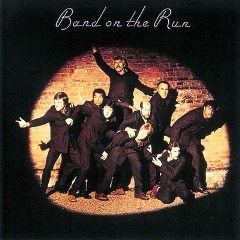Paul McCartney & Wings - Band On The Run (1973)
Paul McCartney & Wings - Band On The Run (1973)

01. Band On The Run - 5:10
02. Jet - 4:06
03. Bluebird - 3:21
04. Mrs Vandebilt - 4:37
05. Let Me Roll It - 4:47
06. Mamunia - 4:50
07. No Words - 2:33
08. Picasso's Last Words (Drink To Me) - 5:47
09. Nineteen Hundred And Eighty Five - 5:26
Personnel:
- Paul McCartney – vocals; lead, rhythm, acoustic and bass guitars, drums,
piano, keyboards, percussion
- Linda McCartney – organ, keyboards, percussion, vocals
- Denny Laine – rhythm, lead, acoustic, flamenco and bass guitars, keyboards,
percussion, vocals
+
- Howie Casey – saxophone
- Ginger Baker, Remi Kabaka – percussion
- Tony Visconti – orchestrations
- Ian and Trevor – backing vocals
Band on the Run is generally considered to be Paul McCartney's strongest solo effort. The album was also his most commercially successful, selling well and spawning two hit singles, the multi-part pop suite of the title track and the roaring rocker "Jet." On these cuts and elsewhere, McCartney's penchant for sophisticated, nuanced arrangements and irrepressibly catchy melodic hooks is up to the caliber he displayed in the Beatles, far surpassing the first two Wings releases, Wild Life and Red Rose Speedway. The focus found in Band on the Run may have to do with the circumstances of its creation: two former members quit the band prior to recording, leaving McCartney, wife Linda, and guitarist Denny Laine to complete the album alone (with Paul writing, producing, and playing most of the instruments himself). The album has the majestic, orchestral sweep of McCartney's Abbey Road-era ambition, with a wide range of style-dabbling, from the swaying, acoustic jazz-pop of "Bluebird" and the appealing, straightforward rock of "Helen Wheels" to the wiry blues of "Let Me Roll It" and the swaying, one-off pub sing-along "Picasso's Last Words (Drink to Me)." Though it lacks the emotional resonance of contemporaneous releases by John Lennon and George Harrison, McCartney's infallible instinct for popcraft overflows on this excellent release. ---Al Campbell, allmusic.com
John Lennon i Paul McCartney byli tymi Beatlesami, którzy mieli największe predyspozycje, aby osiągnąć sukces poza grupą. O ile jednak pierwszy z nich już od początku kariery solowej potrafił zabłysnąć utworami - jeśli nie całymi albumami - na poziomie dokonań Wspaniałej Czwórki, tak działalność McCartneya początkowo przynosiła przede wszystkim rozczarowanie. Po słabym przyjęciu przez krytykę brzmiącego jak demówka debiutu "McCartney" i wypełnionego mdłymi, popowymi melodiami "Ram", muzyk postanowił stworzyć prawdziwy zespół. Niewiele to jednak pomogło, bo dwa pierwsze albumy wydane pod szyldem Wings, "Wild Life" i "Red Rose Speedway", prezentowały niewiele wyższy poziom od wcześniejszych post-beatlesowskich dokonań Paula.
Przełomem okazała się kompozycja "Live and Let Die", napisana do kolejnego filmu o Jamesie Bondzie, "Żyj i pozwól umrzeć". Świetny utwór, pełen zmian nastroju i tempa. McCartney udowodnił nim, że wciąż ma potencjał, by stworzyć coś wielkiego. Co więcej, poziom udało się utrzymać na kolejnym długogrającym albumie Wings, "Band on the Run". Nagranym w składzie okrojonym o gitarzystę Henry McCullough i perkusistę Denny Seiwell, za to z pomocą saksofonisty Howiego Casey'a i słynnego perkusisty Gingera Bakera (znanego m.in. z Cream i Blind Faith).
Pierwsza strona albumu to właściwie przebój za przebojem. Rozpoczynający całość tytułowy "Band on the Run" wyróżnia się licznymi zmianami motywów - tak naprawdę są to trzy utwory połączone w jeden - i bardzo chwytliwym refrenem. Dalej pojawia się dynamiczny "Jet", oparty na gitarowo-saksofonowym riffie. Chwilę wytchnienia przynosi akustyczny "Bluebird", z cudowną solówką na saksofonie. Po chwili jednak znów jest bardziej dynamicznie - i przebojowo - w utworach "Mrs Vandebilt" i "Let Me Roll It". Co ciekawe, ten ostatni bardziej przypomina twórczość Lennona, niż McCartneya, także w warstwie wokalnej. Z kolei melodyjny "No Words" przypomina piosenki George'a Harrisona.
Otwierający drugą stronę longplaya, folkowy "Mamunia" jest ewidentnym wypełniaczem - do bólu banalny i kiczowaty kawałek. Na szczęście pozostałe utwory trzymają poziom. Po wspomnianym już "No Words" następuje trochę dziwny, eksperymentalny "Picasso's Last Words (Drink to Me)", w którym pojawiają się cytaty z innych utworów z albumu ("Jet" i "Mrs Vandebilt"). Finał to kolejny dynamiczny, rozbudowany utwór, "Nineteen Hundred and Eighty-Five", pokazujący, że McCartney potrafi tworzyć także bardziej ambitne kompozycje. W końcówce znowu pojawia się fragment innego utworu, tym razem wyjęty z "Band on the Run". Amerykańskie wydanie longplaya zawierało dodatkowo singlowy, trochę banalny "Helen Wheels". ---pablosreviews.blogspot.com
download (mp3 @320 kbs):
yandex mediafire ulozto gett bayfiles
Zmieniony (Piątek, 05 Kwiecień 2019 21:35)








